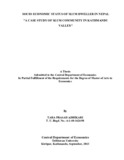Please use this identifier to cite or link to this item:
https://elibrary.tucl.edu.np/handle/123456789/2101| Title: | Socio Economic Status of Slum Dweller in Nepal”: "A Case Study of Slum Community in Kathmandu Valley |
| Authors: | Adhikari, Tara Prasad |
| Keywords: | Slum Dweller;Socio-economic status;Kathmandu valley |
| Issue Date: | Sep-2013 |
| Publisher: | Central Department of Economics Tribhuvan University Kirtipur, Kathmandu, |
| Abstract: | Everyone has a right to live in a decent house, so do the people living in the slum and the squatter communities. It implies that access to various forms of housing should be available. The housing issue of growing squatter population in urban and rural Nepal still remains unaddressed and unsolved due to the lack of specific Policy and programs which creates obstacles in introducing slum upgrading programs and providing securities of tenure. Lack of policy and programs have forced hundreds of thousands of people continue to live in fear and in a vulnerable situation in the slums and squatter settlements in different parts of Nepal. The risk of living in the slums and squatter communities gets higher as these areas becomes targets of development. The capital city Kathmandu is not an exception, rather the problem is more acute and ever growing. As this study showed, almost 40 squatter communities have been in existence in Kathmandu. Some of them are decades old and few are comparatively new. They have migrated to Kathmandu for various reasons and the prominent reason is to attain a secured and better life. They are forced to squat not by choice but by compulsion as they have no access to the current housing market. They are contributing in the city economy by providing valuable service as low paid workers in different areas. However, they have not been integrated into the city development program. Their need and issues like housing, basic facilities and secure tenure poses a big question. Concerned public sectors, private sectors, civil societies and donor agencies need to pay a high attention on slums settlements issues, before the problem becomes too big. Without improving the living condition of the poor and the marginalized people, no development program will be successful neither a city will remain in peace and harmony. It is very important that a high priority must be given in upgrading or arranging alternatives, whichever is an appropriate, in the slum and squatter settlement in Kathmandu valley. The study is "Socio-economic Status of Dwellers in Nepal" (A Case Study on Slum Dwellers in Kathmandu Valley). It has been carried out using primary data sources obtained from Slum settlement area of Kathmandu Valley. The general objectives of this study are to find out the socio-economic condition of Slum Dwellers in Kathmandu Valley. The specific objectives of study area are: a) To find out the financial status of slum dwellers, b) To find out the present settlement status of slum dwellers. c) To find out the expected permanent settlement in future. d) To find out the educational status of slum dwellers. e) To find out the religious status of slum dwellers. f) To find out the health and sanitation status of slum dwellers. g) To find out the Occupational Characteristics of slum dwellers. h) To fine out the social status of slum dwellers. i) To find out the causes and consequences of slum present settlement of slum dwellers in Kathmandu Valley. Descriptive research design has been adopted for this study and other method of Methodology techniques, research design, data collection and interview, sampling etc. are used. There were 40 settlements of Slum dwellers in Kathmandu valley. In both of the settlements (Mandikhatar and Sankhamul), 183 of the total household were selected as sample size. To generate the primary data the structured questionnaire, key informant interview and observation also limited by simple random sampling from the Slum household of this Kathmandu valley only. |
| URI: | http://elibrary.tucl.edu.np/handle/123456789/2101 |
| Appears in Collections: | Economics |
Files in This Item:
| File | Description | Size | Format | |
|---|---|---|---|---|
| 9898 Economics.pdf | 4.77 MB | Adobe PDF |  View/Open |
Items in DSpace are protected by copyright, with all rights reserved, unless otherwise indicated.
